27 july 2019
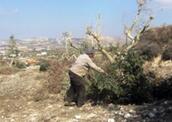
Israeli settlers chopped 80 olive trees for Palestinian farmers in the village of Yasouf, east of the northern West Bank city of Salfit, today reported Yasouf mayor, Khaled Abbieh.
He told WAFA that the land where the trees were cut down is located near the illegal Israeli settlement of Rahalim and it is owned by two brothers who are residents of the village.
The trees’ arson came as Palestinian farmer prepare for the olive picking season, which is done in the autumn. Thousands of families live off harvesting olives.
He told WAFA that the land where the trees were cut down is located near the illegal Israeli settlement of Rahalim and it is owned by two brothers who are residents of the village.
The trees’ arson came as Palestinian farmer prepare for the olive picking season, which is done in the autumn. Thousands of families live off harvesting olives.
26 july 2019
|
|
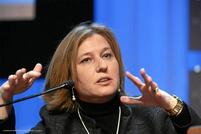
Former Minister of Foreign Affairs of Israel, Tzipi Livni
Much like white South Africans, Jewish Israelis will never voluntarily give up their privileged position as settlers Dissident Israeli scholar Nurit Peled-Elhanan’s important academic study, “Palestine in Israeli School Books” is essential reading for anyone who wants to understand some important realities about the Israeli state and Israeli society. As a settler-colonial entity, real change can never come from within Israeli society. It must be imposed from the outside. |
Much like white South Africans, Jewish Israelis will never voluntarily give up their privileged position as settlers.
South African apartheid was defeated by the masses of South Africa (with the support of some white dissidents), and their political leaders, in alliance with a global solidarity campaign.
In the same way, Israeli apartheid will be defeated by the Palestinian struggle. This struggle is supported by a minority of Israeli dissidents, and by the international solidarity movement – especially the Boycott, Divestment and Sanctions (BDS) movement.
Peled-Elhanan’s book was a major study of 17 Israeli school textbooks on history, geography and civic studies. As you can see from what she says in the interview above, she came to some stark conclusions.
When they even mention Palestinians at all, Israel’s official schoolbooks teach a “racist discourse”, which quite literally wipes Palestine off the map. Maps in the schoolbooks only ever show “the Land of Israel”, from the river to the sea.
She explained that not a single one of the schoolbooks included “any positive cultural or social aspect of Palestinian life-world: neither literature nor poetry, neither history nor agriculture, neither art nor architecture, neither customs nor traditions are ever mentioned.”
Of the rare times that Palestinians are mentioned, it is in an overwhelmingly negative and stereotypical fashion: “all [the books] represent [Palestinians] in racist icons or demeaning classificatory images such as terrorists, refugees and primitive farmers — the three ‘problems’ they constitute for Israel.”
She concluded that the children’s schoolbooks “present Israeli-Jewish culture as superior to the Arab-Palestinian one, Israeli-Jewish concepts of progress as superior to the Palestinian-Arab way of life and Israeli-Jewish behaviour as aligning with universal values.”
All this is quite the opposite of the stereotypical and misleading story about children’s schoolbooks in Palestine. The books printed by the Palestinian Authority since the 1990s are frequently portrayed in anti-Palestinian demonology as putting forth the worst anti-Semitic calumnies about Jewish people.
Overall, this narrative is a crude fabrication instigated by anti-Palestinian propaganda groups, such as that run by Israeli settler Itamar Marcus and his “Palestinian Media Watch”.
Peled-Elhanan’s book comprehensively demolished a second, complementary, Israeli myth: that Israelis – by way of contrast to the dastardly Palestinians – instead “teach love thy neighbour”, to quote Israel’s war criminal ex-foreign minister Tzipi Livni.
Seven years ago, when Peled-Elhanan’s book was published, she warned that, in contrast to liberal hopes for change from within Israeli society, things were moving “backwards and backwards” and that the then-current textbooks were little more than “military manifests”.
“We have three generations of students who don’t even know where the borders,” between the West Bank and the rest of historic Palestine are, she despaired in the interview above, filmed back in 2011.
Seven years on from the book’s publication, things have only got progressively worse.
That can be seen in the video that circulated on social media this week of young Israeli soldiers celebrating and cheering after they dynamited Palestinian homes east of Jerusalem. Those same soldiers are a product of Israel’s education system.
As Israel’s violent oppression of an entire indigenous people become more and more blatant for the world to see, so public opinion is increasingly shifting against Israel – even among the previously supportive voter and activist base of the Democratic Party in the US.
As Israel can rely less and less on outside support, it becomes more important for the apartheid state to circle the wagons, and ensure the next generation of settlers and soldiers are inculcated into the Israeli state’s official ideology – Zionism.
Last month it emerged that Israel has begun requiring all high school students – including those Palestinians who are second-class “citizens” of Israel – to pass an online government propaganda course before they can participate in overseas trips.
According to the Palestinian human rights group Adalah, the course “promotes racist ideology”, brainwashing students with the myth that Palestinians are inherently violent savages.
Adalah says that one question asks: “How do Palestinian organizations use digital social networks?” The required answer is “encouraging violence.”
“Another question asks students to identify the origins of modern anti-Semitism,” Adalah explains. “The exam’s correct answer is ‘Muslim organizations’ and the BDS movement.”
In this way, Israel is teaching its children to hate: hate Palestinians, hate Muslims, hate the Arabs in general and hate anyone who supports or stands in solidarity with them against oppression.
South African apartheid was defeated by the masses of South Africa (with the support of some white dissidents), and their political leaders, in alliance with a global solidarity campaign.
In the same way, Israeli apartheid will be defeated by the Palestinian struggle. This struggle is supported by a minority of Israeli dissidents, and by the international solidarity movement – especially the Boycott, Divestment and Sanctions (BDS) movement.
Peled-Elhanan’s book was a major study of 17 Israeli school textbooks on history, geography and civic studies. As you can see from what she says in the interview above, she came to some stark conclusions.
When they even mention Palestinians at all, Israel’s official schoolbooks teach a “racist discourse”, which quite literally wipes Palestine off the map. Maps in the schoolbooks only ever show “the Land of Israel”, from the river to the sea.
She explained that not a single one of the schoolbooks included “any positive cultural or social aspect of Palestinian life-world: neither literature nor poetry, neither history nor agriculture, neither art nor architecture, neither customs nor traditions are ever mentioned.”
Of the rare times that Palestinians are mentioned, it is in an overwhelmingly negative and stereotypical fashion: “all [the books] represent [Palestinians] in racist icons or demeaning classificatory images such as terrorists, refugees and primitive farmers — the three ‘problems’ they constitute for Israel.”
She concluded that the children’s schoolbooks “present Israeli-Jewish culture as superior to the Arab-Palestinian one, Israeli-Jewish concepts of progress as superior to the Palestinian-Arab way of life and Israeli-Jewish behaviour as aligning with universal values.”
All this is quite the opposite of the stereotypical and misleading story about children’s schoolbooks in Palestine. The books printed by the Palestinian Authority since the 1990s are frequently portrayed in anti-Palestinian demonology as putting forth the worst anti-Semitic calumnies about Jewish people.
Overall, this narrative is a crude fabrication instigated by anti-Palestinian propaganda groups, such as that run by Israeli settler Itamar Marcus and his “Palestinian Media Watch”.
Peled-Elhanan’s book comprehensively demolished a second, complementary, Israeli myth: that Israelis – by way of contrast to the dastardly Palestinians – instead “teach love thy neighbour”, to quote Israel’s war criminal ex-foreign minister Tzipi Livni.
Seven years ago, when Peled-Elhanan’s book was published, she warned that, in contrast to liberal hopes for change from within Israeli society, things were moving “backwards and backwards” and that the then-current textbooks were little more than “military manifests”.
“We have three generations of students who don’t even know where the borders,” between the West Bank and the rest of historic Palestine are, she despaired in the interview above, filmed back in 2011.
Seven years on from the book’s publication, things have only got progressively worse.
That can be seen in the video that circulated on social media this week of young Israeli soldiers celebrating and cheering after they dynamited Palestinian homes east of Jerusalem. Those same soldiers are a product of Israel’s education system.
As Israel’s violent oppression of an entire indigenous people become more and more blatant for the world to see, so public opinion is increasingly shifting against Israel – even among the previously supportive voter and activist base of the Democratic Party in the US.
As Israel can rely less and less on outside support, it becomes more important for the apartheid state to circle the wagons, and ensure the next generation of settlers and soldiers are inculcated into the Israeli state’s official ideology – Zionism.
Last month it emerged that Israel has begun requiring all high school students – including those Palestinians who are second-class “citizens” of Israel – to pass an online government propaganda course before they can participate in overseas trips.
According to the Palestinian human rights group Adalah, the course “promotes racist ideology”, brainwashing students with the myth that Palestinians are inherently violent savages.
Adalah says that one question asks: “How do Palestinian organizations use digital social networks?” The required answer is “encouraging violence.”
“Another question asks students to identify the origins of modern anti-Semitism,” Adalah explains. “The exam’s correct answer is ‘Muslim organizations’ and the BDS movement.”
In this way, Israel is teaching its children to hate: hate Palestinians, hate Muslims, hate the Arabs in general and hate anyone who supports or stands in solidarity with them against oppression.
25 july 2019

This violence will only stop with the end of racist ideology that rationalizes murder
Seven-year-old Tariq Zabania from Al-Khalil (Hebron) was killed on the spot when an Israeli Jewish settler ran his car over him on July 15.
Little Tariq’s photograph, lying face down on the road, was circulated on social media. His untimely death is heartbreaking.
Tariq’s innocent blood must not go in vain. For this to happen, we are morally obliged to understand the nature of Jewish settler violence, which cannot be viewed in isolation from the inherent racism in Israeli society as a whole.
We are all often guilty of perpetuating the myth that militant Jewish settlers in the occupied Palestinian territories are a different and distinct category from other Israelis who live beyond the so-called “Green Line”.
Undoubtedly, the violent mentality that propels Israeli society, wherever it is located, is not governed by imaginary lines but by a racist ideology, of which disciples can be found everywhere in Israel, not just in the illegal Jewish colonies of the West Bank.
Israel is a sick society and its ailment is not confined to the 1967 Occupation of East Jerusalem, the West Bank and Gaza.
While Palestinians are imprisoned behind walls, fences and enclosed regions, Israelis are a different kind of prisoners, too. “A man who takes away another man’s freedom is a prisoner of hatred, he is locked behind the bars of prejudice and narrow-mindedness,” wrote [pdf] the late anti-Apartheid hero and long-time prisoner, Nelson Mandela.
It is this racism and bigotry that makes Tariq invisible to most Israelis. For most Israelis, Palestinian children do not exist as real human beings, deserving of a dignified life of freedom. This callousness is a defining quality, common among all sectors of Israeli society - right, left and center.
An example is the terrorist attack carried out by Jewish settlers against the Palestinian Dawabshe family in the village of Duma, in the northern West Bank in July 2015, resulting in the death of Riham and Sa’ed, along with their 18-months old son, Ali. The only member of the family spared that horrific death was Ahmad, 4, who was severely burned.
This cruelty was further accentuated in the episodes that followed this criminal incident. Later that year, Israeli wedding guests were caught on tape while dancing with knives, chanting in celebration of the death of the Palestinian baby.
Three years later, as the Dawabshe family members were leaving an Israeli court, accompanied by Arab parliamentarians, they were greeted by a crowd of Israelis chanting “Where is Ali? Ali’s dead” and “Ali’s on the grill.”
The passing of time only cemented Israelis’ hatred of a little child whose only crime was his Palestinian identity.
The only survivor, Ahmad, was punished thrice: when he lost his whole family; with his severe burns and when he was denied compensation. The then Israeli Defense Minister, Avigdor Lieberman, simply resolved that the boy was not a “terror victim.” Case closed.
Although the Dawabshes were killed by Jewish settlers, the Israeli court, army and political system all conspired to ensure the protection of the killers from any accountability.
This was no different in the case of Israeli soldier, Elor Azaria, who, on March 24, 2016, killed an unconscious Palestinian man in Hebron. In his defense, Azaria insisted that he was following army manual instructions in dealing with alleged attackers, while top Israeli government officials came out in droves to support him.
When Azaria was triumphantly released following only nine months in jail, he was hailed by many Israelis as a hero. Possibly, he will have a successful career in politics should he decide to pursue that route. In fact, he was courted by Israeli politicians to help them garner more votes in April’s general elections.
Condemning solely Jewish settlers while sparing the rest of Israeli society is equivalent to political whitewashing, one that presents Israel as a healthy society prior to the occupation of the West Bank and Gaza. This view presents Jewish settlements as a cancerous disease that is eating up at the otherwise proud and noble achievements of early Zionists.
It is convenient to classify Jewish settlers as rightwing extremists and to link them with Israel’s ruling right-wing political parties. But history proves otherwise.
It was Israel’s Labor Party that created the settlement projects originally, soon after the colonization of the West Bank. Some of Israel’s largest, and most militant colonial enterprises, in occupied East Jerusalem - Ramat Eshkol, Gilo, Ramot and Armon Hanatziv - are all the creation of the Labor Party, not the Likud.
Neither is the ‘settler’ a new phenomenon. Historically, the early settlers who preceded the establishment of Israel in 1948 were idealized as true Zionists, celebrated as “cultural heroes” - the Jewish redeemers, who eventually ethnically cleansed historic Palestine from its native inhabitants.
“The original Labor movement,” wrote Amotz Asa-El in The Jerusalem Post, “never thought settling beyond the Green Line was illegal, much less immoral.” If there was any debate in Israel regarding settlements, it was never truly concerned with the issue of legitimacy or legality, but practicality: whether these colonial projects can be sustained or defended.
Protecting the settlements is now the overriding task of the Israeli occupation army. The Israeli human rights organization, B’Tselem, which monitors the conduct of the Israeli army and Jewish settlers in the West Bank, explained the nature of this relationship in a report published in November 2017.
“Israeli security forces not only allow settlers to harm Palestinians and their property as a matter of course – they often provide the perpetrators escort and back-up. In some cases, they even join in on the attack,” B’Tselem wrote.
Another Israeli organization, Yesh Din, concluded in a report published earlier that 85% of cases involving settler violence against Palestinians are never pursued by law. Of the remaining cases, only 1.9% led to conviction, which is likely to be inconsequential.
Jewish settler violence should not be analyzed separately from the violence meted out by the Israeli army, but seen within the larger context of the violent Zionist ideology that governs Israeli society entirely.
This violence can only end with the end of the racist ideology that rationalizes murder, like that of little Tariq Zabania.
Seven-year-old Tariq Zabania from Al-Khalil (Hebron) was killed on the spot when an Israeli Jewish settler ran his car over him on July 15.
Little Tariq’s photograph, lying face down on the road, was circulated on social media. His untimely death is heartbreaking.
Tariq’s innocent blood must not go in vain. For this to happen, we are morally obliged to understand the nature of Jewish settler violence, which cannot be viewed in isolation from the inherent racism in Israeli society as a whole.
We are all often guilty of perpetuating the myth that militant Jewish settlers in the occupied Palestinian territories are a different and distinct category from other Israelis who live beyond the so-called “Green Line”.
Undoubtedly, the violent mentality that propels Israeli society, wherever it is located, is not governed by imaginary lines but by a racist ideology, of which disciples can be found everywhere in Israel, not just in the illegal Jewish colonies of the West Bank.
Israel is a sick society and its ailment is not confined to the 1967 Occupation of East Jerusalem, the West Bank and Gaza.
While Palestinians are imprisoned behind walls, fences and enclosed regions, Israelis are a different kind of prisoners, too. “A man who takes away another man’s freedom is a prisoner of hatred, he is locked behind the bars of prejudice and narrow-mindedness,” wrote [pdf] the late anti-Apartheid hero and long-time prisoner, Nelson Mandela.
It is this racism and bigotry that makes Tariq invisible to most Israelis. For most Israelis, Palestinian children do not exist as real human beings, deserving of a dignified life of freedom. This callousness is a defining quality, common among all sectors of Israeli society - right, left and center.
An example is the terrorist attack carried out by Jewish settlers against the Palestinian Dawabshe family in the village of Duma, in the northern West Bank in July 2015, resulting in the death of Riham and Sa’ed, along with their 18-months old son, Ali. The only member of the family spared that horrific death was Ahmad, 4, who was severely burned.
This cruelty was further accentuated in the episodes that followed this criminal incident. Later that year, Israeli wedding guests were caught on tape while dancing with knives, chanting in celebration of the death of the Palestinian baby.
Three years later, as the Dawabshe family members were leaving an Israeli court, accompanied by Arab parliamentarians, they were greeted by a crowd of Israelis chanting “Where is Ali? Ali’s dead” and “Ali’s on the grill.”
The passing of time only cemented Israelis’ hatred of a little child whose only crime was his Palestinian identity.
The only survivor, Ahmad, was punished thrice: when he lost his whole family; with his severe burns and when he was denied compensation. The then Israeli Defense Minister, Avigdor Lieberman, simply resolved that the boy was not a “terror victim.” Case closed.
Although the Dawabshes were killed by Jewish settlers, the Israeli court, army and political system all conspired to ensure the protection of the killers from any accountability.
This was no different in the case of Israeli soldier, Elor Azaria, who, on March 24, 2016, killed an unconscious Palestinian man in Hebron. In his defense, Azaria insisted that he was following army manual instructions in dealing with alleged attackers, while top Israeli government officials came out in droves to support him.
When Azaria was triumphantly released following only nine months in jail, he was hailed by many Israelis as a hero. Possibly, he will have a successful career in politics should he decide to pursue that route. In fact, he was courted by Israeli politicians to help them garner more votes in April’s general elections.
Condemning solely Jewish settlers while sparing the rest of Israeli society is equivalent to political whitewashing, one that presents Israel as a healthy society prior to the occupation of the West Bank and Gaza. This view presents Jewish settlements as a cancerous disease that is eating up at the otherwise proud and noble achievements of early Zionists.
It is convenient to classify Jewish settlers as rightwing extremists and to link them with Israel’s ruling right-wing political parties. But history proves otherwise.
It was Israel’s Labor Party that created the settlement projects originally, soon after the colonization of the West Bank. Some of Israel’s largest, and most militant colonial enterprises, in occupied East Jerusalem - Ramat Eshkol, Gilo, Ramot and Armon Hanatziv - are all the creation of the Labor Party, not the Likud.
Neither is the ‘settler’ a new phenomenon. Historically, the early settlers who preceded the establishment of Israel in 1948 were idealized as true Zionists, celebrated as “cultural heroes” - the Jewish redeemers, who eventually ethnically cleansed historic Palestine from its native inhabitants.
“The original Labor movement,” wrote Amotz Asa-El in The Jerusalem Post, “never thought settling beyond the Green Line was illegal, much less immoral.” If there was any debate in Israel regarding settlements, it was never truly concerned with the issue of legitimacy or legality, but practicality: whether these colonial projects can be sustained or defended.
Protecting the settlements is now the overriding task of the Israeli occupation army. The Israeli human rights organization, B’Tselem, which monitors the conduct of the Israeli army and Jewish settlers in the West Bank, explained the nature of this relationship in a report published in November 2017.
“Israeli security forces not only allow settlers to harm Palestinians and their property as a matter of course – they often provide the perpetrators escort and back-up. In some cases, they even join in on the attack,” B’Tselem wrote.
Another Israeli organization, Yesh Din, concluded in a report published earlier that 85% of cases involving settler violence against Palestinians are never pursued by law. Of the remaining cases, only 1.9% led to conviction, which is likely to be inconsequential.
Jewish settler violence should not be analyzed separately from the violence meted out by the Israeli army, but seen within the larger context of the violent Zionist ideology that governs Israeli society entirely.
This violence can only end with the end of the racist ideology that rationalizes murder, like that of little Tariq Zabania.
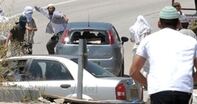
A horde of Jewish settlers on Thursday morning attacked Palestinian vehicles traveling on a road near the town of Silat ad-Dhahr, south of Jenin in the Occupied West Bank.
Local sources told a reporter for the Palestinian Information Center (PIC) that dozens of settlers rallied on the hill where the settlement of Homesh used to be, blocked the Jenin-Nablus road and hurled stones at Palestinian cars.
The settlers also chanted racist slurs and Talmudic songs during their presence in the area.
No one was reportedly hurt in the attack, but several cars sustained material damage.
Local sources told a reporter for the Palestinian Information Center (PIC) that dozens of settlers rallied on the hill where the settlement of Homesh used to be, blocked the Jenin-Nablus road and hurled stones at Palestinian cars.
The settlers also chanted racist slurs and Talmudic songs during their presence in the area.
No one was reportedly hurt in the attack, but several cars sustained material damage.
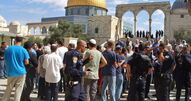
Dozens of Jewish settlers escorted by police forces on Thursday morning desecrated the Aqsa Mosque’s courtyards in groups.
According to the Islamic Awqaf Authority in Occupied Jerusalem, dozens of settlers entered the Mosque through al-Maghariba Gate and toured its courtyards under police guard.
The Aqsa Mosque is exposed to daily desecration by Jewish settlers in the morning and the afternoon except on Fridays and Saturdays.
The Israeli police close al-Maghariba Gate, which is used by Jews to enter the Mosque, at 10:30 am after the settlers complete their morning tours at the holy site. Later in the afternoon, the same gate is reopened for evening tours by settlers.
During the presence of settlers inside the Mosque compound, entry restrictions are imposed on Muslim worshipers at the entrances leading to the Mosque and their IDs are seized until they leave the holy place.
According to the Islamic Awqaf Authority in Occupied Jerusalem, dozens of settlers entered the Mosque through al-Maghariba Gate and toured its courtyards under police guard.
The Aqsa Mosque is exposed to daily desecration by Jewish settlers in the morning and the afternoon except on Fridays and Saturdays.
The Israeli police close al-Maghariba Gate, which is used by Jews to enter the Mosque, at 10:30 am after the settlers complete their morning tours at the holy site. Later in the afternoon, the same gate is reopened for evening tours by settlers.
During the presence of settlers inside the Mosque compound, entry restrictions are imposed on Muslim worshipers at the entrances leading to the Mosque and their IDs are seized until they leave the holy place.
23 july 2019
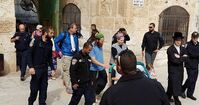
Scores of Israeli settlers on Tuesday stormed al-Aqsa Mosque under heavy police guard.
Local sources said that 80 Jewish settlers in several groups forced their way into al-Aqsa Mosque through al-Maghareba Gate.
They added that the settlers roamed al-Aqsa courtyards and performed Talmudic rituals inside the Islamic compound.
Meanwhile, restrictions were tightened on the Palestinian worshipers entering the site for prayer.
Local sources said that 80 Jewish settlers in several groups forced their way into al-Aqsa Mosque through al-Maghareba Gate.
They added that the settlers roamed al-Aqsa courtyards and performed Talmudic rituals inside the Islamic compound.
Meanwhile, restrictions were tightened on the Palestinian worshipers entering the site for prayer.
22 july 2019
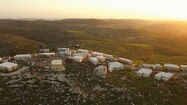
Peace Now reports 32 new remote settlement satellites founded since 2012, mostly farms aiming to take over Palestinian land and many publicly funded
Settlers have established dozens of unauthorized outposts in the West Bank in recent years, most of them founded since President Donald Trump entered office, an Israeli settlement watchdog group said Monday.
Peace Now said in a new report that settlers have founded 32 remote West Bank outposts since 2012, often with tactic government support.
Israel captured the West Bank, East Jerusalem and the Gaza Strip in the 1967 Six-Day War. The Palestinians seek these areas as parts of a future state. Most of the international community considers the Israeli settlements in the West Bank illegal under international law and an impediment to a two-state solution to the conflict.
According to Peace Now, most of the new outposts are farms that aim to take over large tracts of land at the expense of Palestinians and are often publicly funded.
Other cases included the creation of educational institutions and tourist sites that receive funding from their respective government ministries.
"Most of the illegal construction is carried out in an organized manner by officials and with extensive funding from the public coffers," it said.
Scores of settlement outposts dot the West Bank, in addition to over 120 established settlements. Over time, outposts often grow into neighborhoods of nearby settlements or into full-fledged settlements of their own.
Trump's Mideast team is led by figures with close ties to the settler movement. His ambassador to Israel, David Friedman, for instance, recently told the New York Times that Israel has the "right" to annex some of the West Bank.
Both critics and supporters of the settlements say the White House's friendly attitude has encouraged a jump in settlement activity.
Peace Now said the government has retroactively authorized 15 outposts this year and seeks to approve 35 more as part of what it called a major expansion of West Bank settlements.
"Law enforcement authorities ignore the theft of the land and in effect abet this activity," Peace Now said. "Settlers see this correctly as an incentive to build more outposts."
The Defense Ministry and COGAT, the defense body responsible for civil affairs in the West Bank, did not respond to requests for comment.
Settlers have established dozens of unauthorized outposts in the West Bank in recent years, most of them founded since President Donald Trump entered office, an Israeli settlement watchdog group said Monday.
Peace Now said in a new report that settlers have founded 32 remote West Bank outposts since 2012, often with tactic government support.
Israel captured the West Bank, East Jerusalem and the Gaza Strip in the 1967 Six-Day War. The Palestinians seek these areas as parts of a future state. Most of the international community considers the Israeli settlements in the West Bank illegal under international law and an impediment to a two-state solution to the conflict.
According to Peace Now, most of the new outposts are farms that aim to take over large tracts of land at the expense of Palestinians and are often publicly funded.
Other cases included the creation of educational institutions and tourist sites that receive funding from their respective government ministries.
"Most of the illegal construction is carried out in an organized manner by officials and with extensive funding from the public coffers," it said.
Scores of settlement outposts dot the West Bank, in addition to over 120 established settlements. Over time, outposts often grow into neighborhoods of nearby settlements or into full-fledged settlements of their own.
Trump's Mideast team is led by figures with close ties to the settler movement. His ambassador to Israel, David Friedman, for instance, recently told the New York Times that Israel has the "right" to annex some of the West Bank.
Both critics and supporters of the settlements say the White House's friendly attitude has encouraged a jump in settlement activity.
Peace Now said the government has retroactively authorized 15 outposts this year and seeks to approve 35 more as part of what it called a major expansion of West Bank settlements.
"Law enforcement authorities ignore the theft of the land and in effect abet this activity," Peace Now said. "Settlers see this correctly as an incentive to build more outposts."
The Defense Ministry and COGAT, the defense body responsible for civil affairs in the West Bank, did not respond to requests for comment.

Over 100 Israeli settlers on Monday morning stormed al-Aqsa Mosque under heavy police guard.
The Islamic Awqaf in Jerusalem said that 39 settlers, 60 Jewish students from religious institutes, and 18 intelligence officers broke into al-Aqsa Mosque in the early morning hours.
Large police forces accompanied the settlers as they roamed al-Aqsa courtyards.
The Islamic Awqaf in Jerusalem said that 39 settlers, 60 Jewish students from religious institutes, and 18 intelligence officers broke into al-Aqsa Mosque in the early morning hours.
Large police forces accompanied the settlers as they roamed al-Aqsa courtyards.
21 july 2019
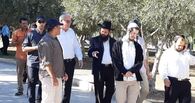
A large number of Jewish settlers led by rabbis desecrated the Aqsa Mosque’s courtyards under police protection on Sunday morning.
The settlers entered the Mosque in groups led by noted extremist rabbis, including Eliyahu Weber and Yoel Elitzur.
Today’s break-ins at the Aqsa Mosque by Jewish settlers were in response to recent calls made by temple mount groups for marching en masse to the holy site.
In recent days, the Israeli occupation police stormed the Bab al-Rahma prayer area of the Aqsa Mosque without removing their shoes several times and confiscated furniture from inside, amid fears of intents to turn the place into a synagogue for settlers.
The settlers entered the Mosque in groups led by noted extremist rabbis, including Eliyahu Weber and Yoel Elitzur.
Today’s break-ins at the Aqsa Mosque by Jewish settlers were in response to recent calls made by temple mount groups for marching en masse to the holy site.
In recent days, the Israeli occupation police stormed the Bab al-Rahma prayer area of the Aqsa Mosque without removing their shoes several times and confiscated furniture from inside, amid fears of intents to turn the place into a synagogue for settlers.
19 july 2019

Hordes of Israeli settlers at daybreak Friday stormed Islamic shrines in Kifl Haris town north of Salfit.
Local residents said that dozens of Israeli settlers entered the town after a large number of Israeli soldiers deployed on the streets.
Every once in a while, Jewish settlers raid Palestinian cities and towns in order to perform rituals at Islamic shrines and historic sites as a prelude to imposing Israel's control over these areas.
Local residents said that dozens of Israeli settlers entered the town after a large number of Israeli soldiers deployed on the streets.
Every once in a while, Jewish settlers raid Palestinian cities and towns in order to perform rituals at Islamic shrines and historic sites as a prelude to imposing Israel's control over these areas.
